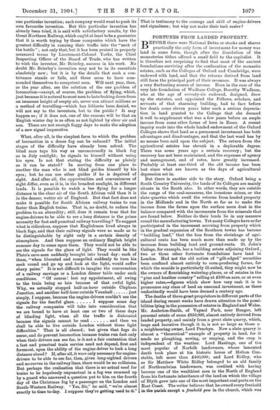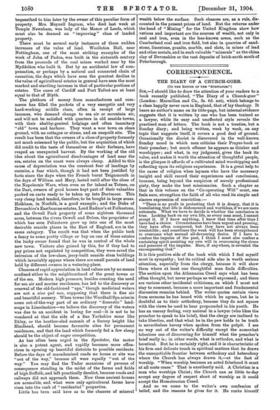B EFORE there were National Debts or stocks and shares practically
the only form of investment for money was land in some form, though after the dissolution of the monasteries tithes offered a small field to the capitalist. It is therefore not surprising to find that most of the ancient foundations surviving after the confiscation of the monastic estates, such as the Colleges of Oxford and Cambridge, were endowed with land, and that the returns derived from land still form the principal part of their revenues. It was always a very fluctuating source of income. Even in the case of the very late foundation of Wadham College, Dorothy Wadham, who at the age of seventy-six endowed, designed, drew up the statutes, and appointed the Fellows, scholars, and servants of that charming building, had to face before her death some eleven years later such a serious deprecia- tion in land granted to the College that she deemed it well to supplement what was a few years before an ample income from some other farms of hers in Essex. A recent inquiry made into the whole landed endowment of the Oxford Colleges shows that land as a permanent investment has both advantages and disadvantages, and that the last word has by no means been said upon the subject. The return from the agricultural estates has shrunk in a deplorable degree. There was some years ago a certain recovery ; but the recovery has not been maintained, and the expenses of agency and management, and of rates, have greatly increased. Probably at least one-third of the old income has been lost since what are known as the days of agricultural depression set in.
But there is another side to the story. Oxford being a South Country University, the lands of its Colleges are mainly situate in the South also. In other words, they are outside the range of the coal-measures, the ironstone mines, or the slate quarries which swell the returns from landed property in the Midlands and in the North se far as to make the income from the farms upon the surface mere dust in the balance compared with the increments from the minerals that are found below. Neither do their lands lie in any measure round the manufacturing towns. Yet many Colleges have so far participated in the increment accruing from property which in the gradual expansion of the Southern towns has become "building land," that the loss from the shrinkage of agri- cultural rents has been much more than made up by the increase from building land and ground-rents. St. John's College, for example, has a building estate adjoining Oxford ; two or three other fortunate foundations have land in London. Had not the old notion of "gilt-edged" securities been confined almost entirely to corn-producing farms, for which the seaside is particularly ill-suited, they might now be the owners of flourishing watering-places, or of estates in the "pine and heather country" selling at 2100 an acre, or at even higher rates,—figures which show how very rash it is to pronounce any class of land an unsound investment, as these undoubtedly would have been deemed a century ago.
The deaths of three great proprietors in different parts of the island during recent weeks have drawn attention to the possi- bilities lying in the possession of estates in England and Wales. Mr. Assheton-Smith, of Vaynol Park, near Bangor, left personal estate of some 2850,000, almost entirely derived from landed property, and mainly from a great slate quarry, which, large and lucrative though it is, is not so large as those o a neighbouring owner, Lord Penrhyn. Now a slate quarry is almost a " theoretical " example of property in land, for it needs no ploughing, sowing, or reaping, and the crop is independent of the weather. Lord Hastings, one of the most popular of Norfolk landowners, whose lamented death took place at his historic house of Melton Con- stable, left more than £400,000; and Lord Ridley, who as Sir Matthew White Ridley belonged to an old family of Northumbrian landowners, was credited with having become one of the wealthiest men in the North of England from his fortunate inheritance of the land on which the village of Blyth grew into one of the most important coal ports on the East Coast. The writer believes that he owned every freehold in the parish except a freehold pew in the church, which was
Temple Newnham, was lady of the Manor of Leeds, which must also be deemed an " improving " class of landed property.
There must be several early instances of these sudden increases of the value of land. Woollaton Hall, near Nottingham, one of the most striking examples of the work of John of Padua, was built in the sixteenth century from the proceeds of the coal mines worked near by the Myddelton who built it. But by an accidental law of com- pensation, or perhaps by a natural and connected chain of causation, the days which have seen the greatest decline in the value of agricultural estates in general have seen the most marked and startling increase in that of particular portions of estates. The cases of Cardiff and Port Talbot are at least equal to that of Blyth.
The plethora of money from manufactures and com- merce has filled the pockets of a very energetic and very hard-working middle class, often in receipt of large incomes, who demand change to sea air or mountain air, and will not be satisfied with quarters in old seaside towns, with their shabby-genteel lodgings and often insanitary "old" town and harbour. They want a new town on clean ground, with no cottages or slums, and an unspoilt site. The result has been that the owners of a class of property formerly not much esteemed by the public, but the acquisition of which did credit to the taste of themselves or their forbears, have reaped an unexpected harvest. By the working of the old idea about the agricultural disadvantages of land near the sea, estates on the coast were always cheap. Added to this cause of depreciation was the constant fear of landings by enemies, a fear which, though it had not been justified by facts since the days when the French burnt Teignmouth in the days of William and Mary, lasted until after the close of the Napoleonic Wars, when even as far inland as Totnes, on the Dart, owners of good houses kept part of their valuables packed on carts ready to be taken up into Dartmoor. This very cheap land tended, therefore, to be bought in large areas. Holkham, in Norfolk, is a good example ; and the Duke of Devonshire's Eastbourne estates, Lord Radnor's at Folkestone, and the Orwell Park property of some eighteen thousand acres, between the rivers Orwell and Deben, the proprietor of which has seen Felixstowe grow up into one of the most desirable seaside places in the East of England, are in the same category. The result was that when the public took a fancy to some pretty village or bay on one of these estates the lucky owner found that he was in control of the whole new town. Visitors also gained by this, for if they had to pay prices not regulated by competition, they were saved the intrusion of the low-class, jerry-built seaside slum buildings which invariably appear where there are small parcels of land held by different owners in a watering-place.
Chances of rapid appreciation in land values are by no means confined either to the neighbourhood of the great towns or of the sea. Modern high pressure, besides creating the need for sea air and marine residences, has led to the discovery or renewal of the old-fashioned "spa," though medicinal waters are not a sine qua' non, supposing that there is fine air and beautiful scenery. When towns like Woodhall Spa arise in some out-of-the-way part of an ordinary "domestic" land- scape in Lincolnshire—we believe the discovery of the waters was due to an accident in boring for coal—it is not to be wondered at that the side of a fine Yorkshire moor like Ilkley, or the heather-clad summit of a Surrey height like Hindhead, should become favourite sites for permanent residences, and that the land which formerly fed a few sheep should be the object of eager competition.
As has often been urged in the Spectator, the motor is also a potent agent, and rapidly becomes more effica- cious in opening up beautiful districts to possible residents.
Before the days of macadamised roads no house or site was "out of the way," because all were equally "out of the way." You may find the Tudor mansions of persons of consequence standing in the midst of the farms and fields of high Suffolk, and left practically derelict, because roads and railways did not approach them. Now these ancient houses are accessible, and what were only agricultural farms have risen into the rank of "residential" properties.
Little has been said here as to the chances of mineral wealth below the surface. Such chances are, as a rule, dis- counted in the present prices of land. But the returns under the head of " Mining " for the United Kingdom show how various and important are the sources of wealth, not only in coal and iron, even in the less-known areas, such as the Cumberland coal and iron field, but also in quarries of sand- stone, limestone, granite, marble, and slate, in mines of lead and other metals, and in such valuable " minerals " as the china clay of Devonshire or the vast deposits of brick-earth south of Peterborough.



































 Previous page
Previous page